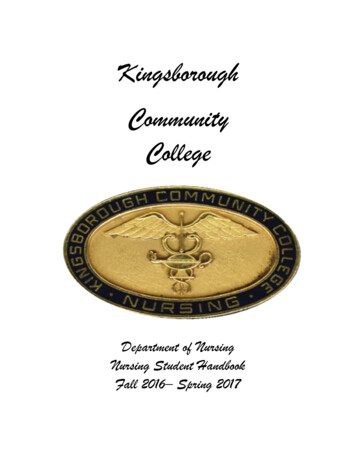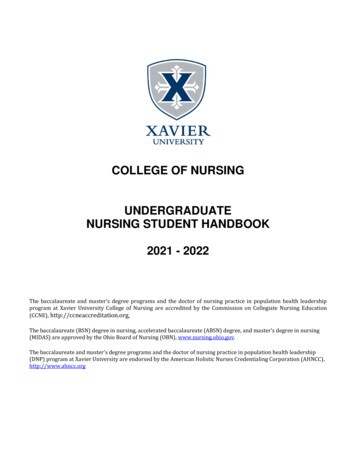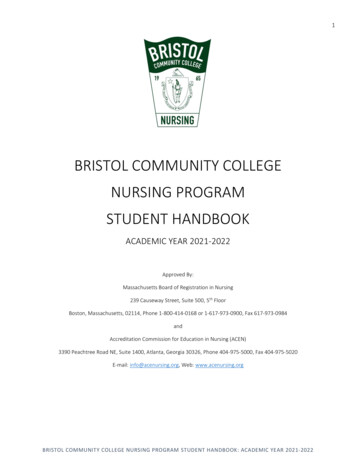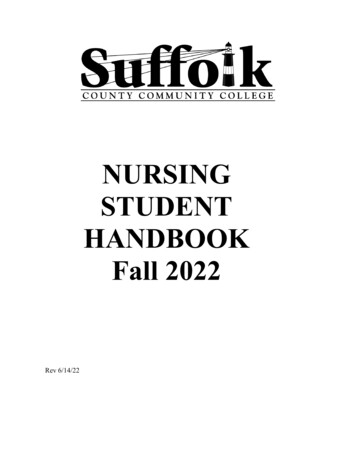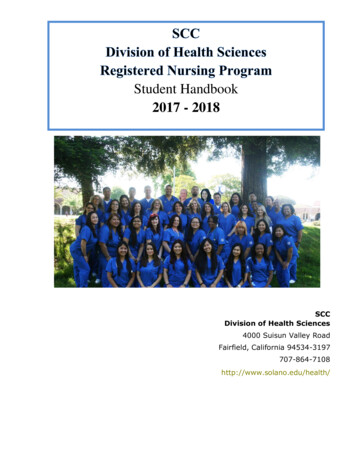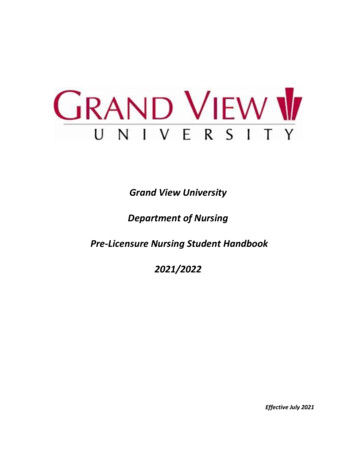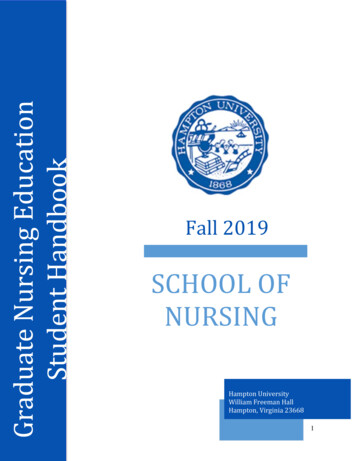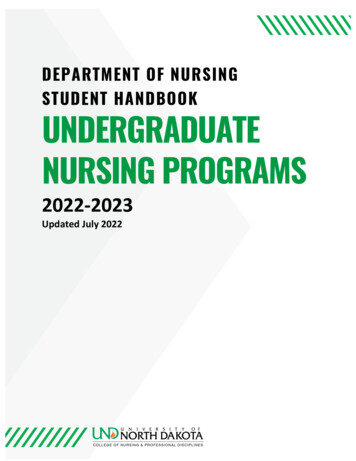
Transcription
DEPARTMENT OF NURSINGSTUDENT HANDBOOKUNDERGRADUATENURSING PROGRAMS2022-2023Updated July 2022
We are pleased to welcome all incoming and returning BSN students to the College ofNursing and Professional Disciplines (CNPD) at the University of North Dakota (UND).Congratulations on building your professional nursing career with us. Your experiencesat UND will provide opportunities for you to build the knowledge, skills, and abilities toprovide quality health care in the state of North Dakota and beyond. During your studiesin the CNPD, you will engage with challenging courses, exceptional faculty, andinspiring mentors. You will also develop relationships with lifelong friends andcolleagues. Our faculty and staff are here to support your program of study and willassist you with all phases of your academic journey.We have prepared this Bachelor of Science in Nursing Handbook to provide you withinformation about academic and general student matters that can facilitate your learningexperiences and interactions in the CNPD. Please review both the Department ofNursing Student Handbook as well as the following Undergraduate Nursing Handbookprior to signing the acknowledgement statement, in the DocuSign email sent to you.Other resources that will assist you are the University of North Dakota University ofNorth Dakota Undergraduate and Graduate Academic Catalog and the UND Codeof Student Life found respectively on the Office of the Registrar and Office of StudentRights and Responsibilities websites.Our dedicated faculty and staff are here to help you succeed in your undergraduatenursing education. Please feel free to consult with us if you need further information orclarification on any content in this handbook.Wishing you a successful school year!Dr. Stephanie Christian, PhD, RNUndergraduate Program Chair and Clinical Associate ProfessorDr. Maridee Shogren, DNP, CNM, CLCDean and Clinical Professor
Table of ContentsBACCALAUREATE NURSING PROGRAM . 3BACCALAUREATE NURSING PROGRAM OUTCOMES . 3BSN TRADITIONAL TRACKS . 3TRADITIONAL TRACK. 3RN TO BSN TRACK . 3UNDERGRADUATE STUDENT NURSING ORGANIZATIONS AT UND . 3NURSING STUDENT CONDUCT STANDARDS POLICY . 5ADVISEMENT AND REGISTRATION . 11ACADEMIC ADVISEMENT . 11ADMISSION CRITERIA FOR TRADITIONAL BSN PROGRAM POLICY . 12ADMISSION POLICY RN TO BSN . 15RN-BSN POLICIES . 16UNDERGRADUATE STUDENT FUNCTIONAL ABILITIES POLICY . 17CURRICULAR POLICES . 18INTEGRATION OF ATI MATERIAL INTO UNDERGRADUATE CURRICULUM . 18UG NURSING EXAM ADMINISTRATION PROCEDURE FOR STUDENTS . 19GRADING SCALE FOR UNDERGRADUATE NURSING COURSES . 21UNDERGRADUATE PROGRAM GRADING PROCEDURE . 22RETENTION OF STUDENT EXAMINATION AND GRADED COURSE MATERIALS. 24SENIOR HONORS GUIDELINES . 24PLACEMENT FOR OUT OF SEQUENCE STUDENTS POLICY . 25PROBATION & DISMISSAL FROM THE UNDERGRADUATE NURSING PROGRAM . 26PETITIONS/APPEALS POLICY. 27COURSE AND CLASSROOM REQUIREMENTS . 27COURSE SYLLABUS. 27TEXTBOOKS . 27CLASSROOM ETIQUETTE . 27REFERENCE MANUAL FOR WRITING PAPERS . 28ACADEMIC DISHONESTY POLICIES . 28CLINICAL EXPERIENCE POLICIES . 28AGENCY REQUIREMENTS . 28TRANSPORTATION POLICY . 29Undergraduate Nursing Program 2022-20231
TRANSPORTATION OF CLIENTS . 29TRANSPORTATION OF STUDENTS . 29AIR/GROUND PATIENT TRANSPORT . 29PROFESSIONAL APPEARANCE & EQUIPMENT REQIREMENTS . 30STUDENT ATTENDANCE . 32NURSING ACADEMIC INTERNSHIP & COOPERATIVE EDUCATION . 32LICENSING POLICY FOR STUDENTS LICENSED THROUGH A STATE BON . 33DEPARTMENT OF NURSING PINNING CEREMONY . 34ESSENTIAL DOCUMENTS . 34APPENDICES . 35APPENDIX A: NURSING STUDENT CONDUCT STANDARDS PROCEDURE. 36APPENDIX B: BACHELOR OF SCIENCE IN NURSING--PLAN OF STUDY GRID . 38APPENDIX C: RN/BSN NURSING CURRICULUM SEQUENCE . 40APPENDIX D: UG NURSING STUDENT FUNCTIONAL ABILITIES PROCEDURE . 42APPENDIX E: UG NURSING STUDENT FUNCTIONAL ABILITIES RELEASE FORM . 43APPENDIX F: INTEGRATION OF ATI MATERIALS INTO UG CURRICULUM . 44APPENDIX G: ATI SCHEDULE FOR TRADITIONAL BSN PROGRAM PROCEDURE . 46APPENDIX H: ACADEMIC PETITION/APPEALS PROCEDURE AND MATRIX . 48Undergraduate Nursing Program 2022-20232
BACCALAUREATE NURSING PROGRAMGraduates earn a Bachelor of Science in Nursing degree and are eligible to sit for the NCLEX-RN examination administered by the National Council of State Boards of Nursing (NCSBN). The curriculumprepares professional nurses to work in a variety of settings, building upon a foundation of liberal arts,sciences and nursing.BACCALAUREATE NURSING PROGRAM OUTCOMESUpon completion, BSN graduates will be able to: Assume responsibility for leadership and management within health care systems that areinfluenced by health care policy, economics, and regulatory environments. Utilize theoretical and research evidence to inform practice and make clinical judgements incollaboration with other team members. Demonstrate competency in integrating innovations in patient care technology while maintainingthe patient as the focus of care. Communicate and collaborate effectively while working with individuals, families, groups,populations and the health care team to improve health care outcomes. Demonstrate values consistent with the practice of professional nursing, including caring,honesty, civility, social justice and respect for all persons. Demonstrate knowledge, skills, and attitudes necessary to provide safe, competent nursing carewith diverse populations across the life span.BSN TRADITIONAL TRACKSThe Department of Nursing offers two options which lead to a Bachelor of Science in Nursing.TRADITIONAL TRACKCurrently the largest program, it is typically replete with students who come to UND as freshmen ortransfer students without a previous bachelor's degree or RN license. Courses are completed on-campuswith clinical experiences in Grand Forks and the surrounding region. Following completion of pre-requisitecourses students apply for admission to this track and nursing courses are completed in four semesters.RN TO BSN TRACKRegistered nurses with a diploma or associate degree in nursing, who wish to attain a BSN, may apply tothis program. In addition to completing the requirements for a bachelor’s degree through transfer creditsand/or UND courses, the RN-BSN may be completed full-time (12 months) or part-time (24 months).Courses are completed online utilizing distance education technology.UNDERGRADUATE STUDENT NURSING ORGANIZATIONS AT UNDNursing Student CouncilThe Student Council serves as an official channel of communication between students, the CNPDDepartment of Nursing administration, faculty and the University. As a nursing student, you are a memberof the Student Council and can use this as a means to participate in the affairs of your College, as well asgain networking skills and peer support. Development of teamwork and leadership ability goes along withthe inner confidence attained in active participation. Several standing committees exist in the CNPDDepartment of Nursing in which students may hold positions.Undergraduate Nursing Program 2022-20233
Some of these are: Undergraduate and Graduate Council. Assessment Committee. Research and Scholarship Committee.Student representation is also available on the UND Faculty Awards Committee, UND GovernanceCouncil and on the UND Senate.Student Council meetings are held monthly and usually take place in Room 102 over the noon hour. Allstudents are encouraged to attend whenever their schedules allow. Please watch for email informationregarding meetings and further information. The email correspondence will include the names of theOfficers or Faculty Advisors.Nursing Student AssociationAs a nursing student, you can become involved in a national organization and have your voice heard atthe College, State and National levels of the Association. Joining NSA will connect you with 60,000nursing students nationwide who are already taking advantage of the many programs and benefits theAssociation has to offer. Membership in NSA provides scholarship opportunities, reduced rates on health,accident and malpractice insurance, opportunities to attend and participate in State and Nationalconventions and more. To learn more about NSA, come to one of the meetings or contact any of theOfficers or Faculty Advisors.As pre-professionals, nursing students are expected to represent the University of North Dakota, Collegeof Nursing and Professional Disciplines and the nursing profession in the classroom, clinical andcommunity setting. The Nursing Student Conduct Standards (Policy 257) applies to all pre nursing, directadmit and admitted nursing students.Back to TopUndergraduate Nursing Program 2022-20234
NURSING STUDENT CONDUCT STANDARDS POLICYPolicy Number:Policy Name:Reviewed by:Last Review Date:257Nursing Student Conduct Standards PolicyNursing Faculty01/18/19Introduction:The College of Nursing and Professional Disciplines (CNPD) Department of Nursing seeks to promoteand ensure academic honesty and integrity among students. The goal of this policy is to promote anenvironment which maintains the ethical and professional standards as established by the AmericanNurses Association Code of Ethics at ngexcellence/ethics/ and the UND Code of Student Life.Conduct Standards:In order to facilitate a strong learning environment for all students and promote professionalism, highstandards of academic and professional performance are required of all students. Students are expectedto represent the University of North Dakota, College of Nursing and Professional Disciplines, and thenursing profession in a positive manner in the classroom, clinical settings and community. Studentsparticipating in clinical experiences are required to abide by the policies of the partnering institutions. Thefollowing professional attributes are expected of all students: respect, honesty, integrity, accountability,responsibility, confidentiality and professional conduct.I.Learning Environment Behavior Expectations: In all nursing courses at the University of NorthDakota, students are representatives of the College of Nursing and Professional Disciplines.Students and faculty have the right to be respected and treated with dignity. The “classroom”includes all learning environments, such as classrooms, clinical and community settings, andonline environments.A. To create a positive learning environment, the following must occur:i. Active engagement in learningii. Completion of preparation for classiii. Sharing perceptions during group discussionsiv. Respectfully listening to and honoring the contributions of othersv. Using appropriate professional verbal and non-verbal communication skills to includehonesty, integrity, and respect in their interactions with peers, colleagues, agencypersonnel, faculty and clientsvi. Maintaining confidentiality during simulation is expected.B. Expectations for professional behavior in the classroom, laboratory, and clinical sites includethe following:i. Arrive for class on time. Class attendance and promptness are required. Practicingprofessional behaviors includes the expectation that you inform the course facultythat you cannot attend class, prior to the start of class, just as you would notify yoursupervisor if you were going to miss work. Stay for the entire class period unless priorapproval to leave early has been approved by course faculty.Undergraduate Nursing Program 2022-20235
ii. Arrive for class prepared. Students are expected to participate in their own andothers’ learning by completing the assigned readings prior to class and bycontributing ideas, experiences, questions, and opinions during class.iii. Remain alert and attentive throughout class. Please do not bring anything to theclassroom that is not related to the class, including textbooks, assignments,newspapers, magazines, etc. Side conversations or other disruptive behavior isunprofessional.iv. Laptop/tablet use is only allowed during class when approved by the course facultyas long as it pertains to class material and is not disruptive.v. Cell phone usage during class is not allowed unless prior approval from the coursefaculty has been obtained. This includes NO phone calls, text messaging, emails,internet use, gaming or other activities that do not pertain to the course.vi. Professional dress is required during clinical, simulation, lab experiences,professional meetings and/or student presentations in accordance with individualagency policies. Professional dress expectations will be addressed in individualcourse syllabi.vii. Bringing family members, guests and pets to the classroom and any college relatedprofessional activity is not allowed unless prior approval from the course faculty hasbeen obtained.viii. Adhering to all course policies as stated in individual course syllabi.C. Additional expectations for clinical experiencesi. The primary responsibility of nursing students in clinical settings is the welfare ofclients.ii. Clinical Removal:a. A student exhibiting behaviors in the clinical setting which are deemed by theresponsible faculty member to be unprofessional and/or unsafe to themental, emotional or physical welfare of clients, staff, self or others shall besubject to immediate removal from the clinical experience until the issue hasbeen resolved.b. An agency shall have the right to request of the faculty that a student beremoved from the clinical agency because of performance which is deemedunprofessional and/or unsafe to the mental, emotional or physical welfare ofclients, staff, self or others. The agency may remove the student from clientcontact and notify the clinical faculty or department chair immediately.Removal from the clinical experience will continue until the issue has beenresolved.II.Academic Misconduct: Academic misconduct encompasses all kinds of academic dishonesty,deliberate or unintentional. Any suspected instance of misconduct will be investigated. Thefollowing list of examples is not exhaustive and occurrences of other types of suspectedmisconduct will be investigated.Undergraduate Nursing Program 2022-20236
A. Cheating and unauthorized material on examinations and other assignmentsi. All examinations and other assignments are to be completed by the student alone,without inappropriate assistance of any kind unless authorized by course faculty.ii. Assisting another student to cheat is an Academic Integrity Code violation. Thisincludes providing another student with a paper or assignment, or any other form ofassistance, where you know, or reasonably should know, that the other student willuse it to cheat.iii. Exams:a. No assistance is to be given to or received from other persons;b. No books, notes or other materials are to be consulted;c.Electronic devices, to include: laptops, tablets, cellphones, calculators orother electronic devices are not permitted;d. If a calculator or other electronic device is permitted, it is to only be used forthe intended purpose, as described by the course faculty.B. Academic misconduct in online assignmentsi. Online assignments are subject to the same standards of integrity that apply totraditional classroom assignments.C. Submitting the same assignment for different classesi. Submitting the same assignment for a second class violates the assumption thatevery assignment advances a student's learning and growth. Unless the secondcourse faculty expressly allows it, submitting an assignment already submitted foranother class is a form of cheating. This is also known as self-plagiarism.D. Intentional dishonestyi. Deceiving a course faculty in order to obtain an excused absence, an extension on adue date, a makeup examination, an incomplete, etc. is considered academicdishonesty.ii. It is an Academic Integrity Code violation to steal, destroy, or alter another students’work, gain unauthorized access to faculty offices, email accounts, or coursemanagement services.E. Improper collaboration and collusioni. Collaboration means working together. Collusion means unauthorizedcollaboration.ii. Permission from the course faculty to "work together" on an assignment, project, orpaper is not permission to violate the rules of integrity. Unless the course facultyspecifies otherwise, it is assumed that all work submitted for a grade will be theproduct of the student's own understanding, and thus expressed in the student's ownwords, calculations, etc. When a student's work is identical or very similar to anotherstudent’s work when individual variations would be expected, it is reasonable for thecourse faculty to conclude that collusion has occurred.Undergraduate Nursing Program 2022-20237
F. Plagiarismi.Plagiarism is the most common form of academic misconduct. Plagiarism occurswhen a student misrepresents, as his/her own work, the work, written or otherwise, ofany other person (including another student) or of any institution. All types of worksubmitted by students are covered by this definition including written assignments,diagrams and pictures.ii. The following rules apply:a. Submission of the same or substantially similar work of another personwithout proper acknowledgement of the source.b. Improper documentation of quotes, words, ideas or paraphrased passagestaken from published or unpublished sources without properacknowledgement of the source.c.The close paraphrasing of another’s work by simply changing a few words oraltering the order of presentation without proper acknowledgement of thesource.d. Use of another student’s work while representing it as your own.e. Unauthorized submission of a paper as original work in one course whencredit has been received in another course.f.III.Attempts to receive credit for group work when a group member has notparticipated or contributed to the group project.Professional Misconduct: Professional misconduct encompasses any actions on the part of astudent which might render them unsuitable to undertake/continue a professional-orientedcomponent of their program of study. Examples of professional misconduct include:A. Violation of professional code of ethics.B. Falsifying information of any kind or misrepresenting information to the college oruniversity.C. Theft, damaging, defacing or unauthorized use of university, college or clinical agencyproperty.D. Confidentiality: As part of your education, you may need to share specific patient data withthe health care facility staff, course faculty, or other students. The sharing of patient data inverbal, written, and electronic formats is only appropriate when you do so as a part of yourclinical training.i. Unauthorized accessing or sharing confidential information regarding faculty, staff, orstudents.ii. Unauthorized accessing or sharing confidential information regarding patients inclinical settings. Refer to HIPAA training.Undergraduate Nursing Program 2022-20238
E. Civility: Uncivil behaviors are disrespectful and devalue the person targeted. Behaviors andlanguage that cause emotional harm and violates the dignity of an individual or groupconstitutes incivility. This includes, but is not limited to, peers, faculty, staff, clients andagency personnel. Examples are as follows:i. Demeaning languageii. Yellingiii. Gossipingiv. Intimidationv. Threateningvi. Bribing someonevii. Instigatingviii. Inflammatory written communicationix. Rudenessx. Ostracizingxi. Violence or any other disrespectful behaviorF. Technology:i. Inappropriate use of electronic devices in the classroom and clinical setting.Audio/video recording or taking photos in a classroom, lab, simulation or clinicalsetting is prohibited without prior approval from course faculty.ii. Students may be audio/video recorded, or photographed in a classroom, lab,simulation or clinical settings for assessment and/or evaluation purposes only as partof the classroom learning.iii. Social Media Guidelines:1) See White Paper: A Nurse’s Guide to the Use of Social Media2) See Guidelines for Using Electronic and Social Media: The RegulatoryPerspective3) Inappropriate use of social media that violates standards of academic andprofessional conduct of the college and university. Social media ischaracterized as a platform of electronic communication (web sites for socialnetworking and blogging) through which users create online communities toshare information, ideas, personal messages, and other content (videos,pictures), etc. Social media outlets include, for instance: Social Networking Sites (Facebook, LinkedIn, Pinterest, Foursquare,Instagram, Flickr) Content Communities (YouTube) Micro-blogging sites (Twitter) Blogs (company and personal blogs, Wordpress, Blogger), Forumsand Discussion Boards (Google Groups, Yahoo! Groups)Undergraduate Nursing Program 2022-20239
4) Social Media myths and misunderstandings according to the National Councilof State Boards of Nursing (NCSBN, 2011) include: A mistaken belief that the communication or post is private andaccessible only to the intended recipient. The nurse may fail to recognizethat content once posted or sent can be disseminated to others. A mistaken belief that content deleted from a site is no longer accessible.The moment something is posted, it lives on a server that can always bediscoverable in a court of law. A mistaken belief that it is harmless if private information about patientsis disclosed if the communication is accessed only by the intendedrecipient. This is still a breach of confidentiality. A mistaken belief that it is acceptable to discuss or refer to patients ifthey are not identified by name, but referred to by a nickname, roomnumber, diagnosis or condition. This too is a breach of confidentiality anddemonstrates disrespect for patient privacy. Confusion between a patient’s right to disclose personal informationabout himself or herself (or a health care organization’s right to discloseotherwise protected information with a patient’s consent) and the needfor health care providers to refrain from disclosing patient informationwithout a care-related need for the disclosure.Approved by Undergraduate Nursing Council R 04/08/16Approved by Nursing Faculty: R 04/29/16; R 01/17/18; R 01/18/19SEE APPENDIX A: Nursing Student Conduct Standards Procedure – 257aBack to TopUndergraduate Nursing Program 2022-202310
ADVISEMENT AND REGISTRATIONACADEMIC ADVISEMENTEach undergraduate student is assigned an Office of Student Services (OSS) and a nursing facultyadvisor. In addition, students in the RAIN program are assigned a RAIN advisor.OSS AdvisorThe student’s assigned OSS advisor will provide assistance in the following: Class registration support Program audits/graduation and semester Referral for basic tutoring needs Emergency notifications Coordination of referrals and services for students in crisis (through the Director of the Office ofStudent Services) Financial aid/scholarships and referral Maintenance of the academic file/student records General questions about admission and other documentation General questions about verificationsStudents are strongly encouraged to see their OSS advisor each semester. Advising includes much morethan course selection. Advisement with an OSS advisor is particularly important prior to admission to theprogram, prior to each registration period and prior to graduation from the program. Students areultimately responsible to see that all academic requirements are completed, however advisors areavailable to assist you whenever possible. It is helpful to make an appointment in advance online throughthe Starfish system. Advisor assignments are available in Campus Connection, or through inquiry at theOSS.Faculty AdvisorNursing faculty advisors are available to assist students with academic questions or concerns. Eachstudent’s faculty advisor will provide assistance with the following: Removal of academic holds (semester holds for deficiency or failing grades) Assistance with academic support for nursing classes Approval for course over-rides ATI support Grievance Process Professional/career advisement Course related issues Clinical related issues Internship discussionsBack to TopUndergraduate Nursing Program 2022-202311
ADMISSION CRITERIA FOR TRADITIONAL BSN PROGRAM POLICYPolicy Number:Policy Name:Reviewed by:Last Review Date:206Admission Criteria for Traditional BSN ProgramUndergraduate Council09/10/2021A. OverviewIn order for students to assure their nursing program application will be considered applicants mustapply for admission to University of North Dakota (UND) and submit required documentation by theposted UND deadlines. Student must be admitted to UND prior to applying to the Nursing program.B. Admission Committee and Selection ProcessThe Undergraduate Nursing Admission Committee will be composed of two undergraduate nursingfaculty (one faculty member will be elected as chair), Chair of the Undergraduate NursingDepartment, RN-BSN Director, Office of Student Services Director or designee and RAIN designee.Admission decisions are made using a blind review process. Applicants who are not grantedadmission are notified and are eligible to reapply in a subsequent semester. A limited number ofstudents will be placed on a waiting list if there is an excess of qualified applicants. In the event that astudent has not received notification in the above stated timely fashion, it is the student'sresponsibility to contact the Office of Student Services in the Department of Nursing to inquire aboutthe status of their application.C. Traditional On-Campus BSN Program AdmissionTraditional BSN courses are sequenced to build upon one another over four semesters. Studentsmay begin the four-semester sequence in either the fall or spring semester. Application andadmission dates and deadlines will be posted on the CNPD website. Students who currently hold anunencumbered LPN license must follow and apply following the same guidelines as traditionalstudents.I.Direct Admission:Direct admission is a criterion-based early admission program for pre-nursing studen
As pre-professionals, nursing students are expected to represent the University of North Dakota, College of Nursing and Professional Disciplines and the nursing profession in the classroom, clinical and community setting. The Nursing Student Conduct Standards (Policy 257) applies to all pre nursing, direct admit and admitted nursing students.
